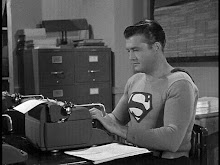 the experience is one where the director and the actor piggyback off of each other and work in such harmony that they can complete ideas and thoughts from the other. These cases have been few and far between for me, notable exceptions being the times I've worked with Tim Brown at Cedar Crest College. Usually, the experience is an overall neutral one, in which both artists get along with each other reasonably well, but nothing dramatic comes of it.
the experience is one where the director and the actor piggyback off of each other and work in such harmony that they can complete ideas and thoughts from the other. These cases have been few and far between for me, notable exceptions being the times I've worked with Tim Brown at Cedar Crest College. Usually, the experience is an overall neutral one, in which both artists get along with each other reasonably well, but nothing dramatic comes of it.  Other times, the relationship is rocky and fraught with danger. Good thing this next picture is only a "demonstration" of an actor giving in to his full on rage.
Other times, the relationship is rocky and fraught with danger. Good thing this next picture is only a "demonstration" of an actor giving in to his full on rage.In meeting with the director to discuss her scene, it also brought to mind one of the principle duties of the actor that I'd like to reflect on. We went through the short four-page script several times, including a couple of times going line by line. She wanted to hear thoughts, approaches to the material, and basically "performances" of the lines so she could tell me which ones she liked the best. Like many other good directors I've worked with, she had an idea that she conveyed by expressing emotions and qualities that she wanted me to exhibit. Facing such instruction, I needed to make notes in my script that I could act in the scene. When she gave me an instruction to be more harsh with a line, I decided that the line would be delivered as the end to the conversation. When I gave her my reading, it was exactly what she was looking for. It is, ultimately, the actor's job to translate the ideas of the actor and the director into something that will register onstage or onscreen. They can't complain about the unclear direction or "unplayable" notes, since it is up to those actors to take what the director tells them and turn it into something they can do in the course of their performance.
And hopefully when actors can master this skill, they will prevent their directors from looking at them like this.


2 comments:
i freakin' love tim brown! haha
Yea, I love Tim Brown too. Hence the inclusion of all his pictures on this entry. But count yourself lucky... it could have been pictures of us working with you!
Post a Comment